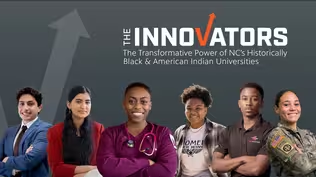
UNC Pembroke's Research on Brain Injury & Memory Diseases
Special | 3m 30sVideo has Closed Captions
UNC Pembroke undergrad research takes a closer look at TBI and memory disorders.
UNC Pembroke faculty and undergraduate researchers are making strides into better understanding links between neurological disorders like Alzheimer’s Disease and traumatic brain injuries (TBI). The research and resulting therapies discovered could benefit military personnel, veterans, and high-impact athletes and enhance the quality of life for millions now and in the future.
Problems playing video? | Closed Captioning Feedback
Problems playing video? | Closed Captioning Feedback
The Innovators is a local public television program presented by PBS NC

UNC Pembroke's Research on Brain Injury & Memory Diseases
Special | 3m 30sVideo has Closed Captions
UNC Pembroke faculty and undergraduate researchers are making strides into better understanding links between neurological disorders like Alzheimer’s Disease and traumatic brain injuries (TBI). The research and resulting therapies discovered could benefit military personnel, veterans, and high-impact athletes and enhance the quality of life for millions now and in the future.
Problems playing video? | Closed Captioning Feedback
How to Watch The Innovators
The Innovators is available to stream on pbs.org and the free PBS App, available on iPhone, Apple TV, Android TV, Android smartphones, Amazon Fire TV, Amazon Fire Tablet, Roku, Samsung Smart TV, and Vizio.
Providing Support for PBS.org
Learn Moreabout PBS online sponsorship[soft music] - We really wanted to help the military families in the area, so that's why we took on the Army project to look at blast effects on brain tissue.
Since many studies have shown that people in the military have a higher susceptibility of Alzheimer's disease, the Army wanted us to take the brain tissue that we keep alive in a dish, and they actually set off a military blast, real military explosives, so it exhibits the shock wave right through the tissue.
And then we look at the small changes that happen in the tissue.
We're finding the very earliest signs of changes to the connections in your brain, the same connections you use for memory and behavior, and those start to show the earliest signs of what happens in Alzheimer's disease.
So years later, people might start developing dementia.
- My favorite part about going to school here is the Bahr Lab.
Being part of the Alzheimer's research and having part to do with the military blast research also, that's pretty amazing.
- What we try to do is understand and make a way to make people live longer but also living better.
And that is really important for us to understand in any aspect of change that is related with life, that is related the environment, where they live, and how this can affect and change the brain.
We have different students with different backgrounds and they can learn not only how to do science, but how to apply in science, no matter what field they go.
And then we have many and many example of students that came here, be trained, and work with us, that they always teach us something, and we always teach them at least a little bit about science.
- They have a broad view.
Sometimes we are too narrow, looking at the data and a student just come, "Oh, what you're doing?"
Then we say, "Oh, I'm trying to see how this is possible."
And then the student just pointed out something.
They say, "Yeah, that's what's makes sense."
- I'll never forget the first time I met Dr. Bahr and I wish every interaction happened like this.
So I come in for an interview and I sit down in his desk and then he comes in and he's like, "Hi, I'm Dr. Bahr, nice to meet you."
I was like, "Nice to meet you."
He's, "Here's a brain tissue."
I was like, "What?"
He had this like thing in a glass with, and he's like, "This is the CA1 of the hippocampus."
And I was just like, yes.
Instantly, it was like I was hooked.
I was like, "This is so cool."
And the practical applications of it, it's not just like, we're not doing random things.
So like we have this brain issue that we're turning into this protein assay, 'cause there's actual results here that we can find.
And that sort of made me fall in love more with science in general.
And so I feel like I wouldn't be the same person if I didn't come to the Bahr Lab.
Words can't describe the amount of opportunity I'm given here in terms of procedure and in terms of just full autonomy.
I talked to a lot of different friends I have that go to different universities and this sort of thing, they talk about just being glorified pipetters, that they're, you know, there's the samples.
Put the gel in and you're good, but there's so many times where they'll teach me something and it's like, "All right, go do it.
"I'll be in the office if you have any questions."
It's sort of just like full go and you make mistakes.
Of course you do, but you learn and given that opportunity, there's no words to describe how great that is.
[soft music]
Support for PBS provided by:
The Innovators is a local public television program presented by PBS NC














